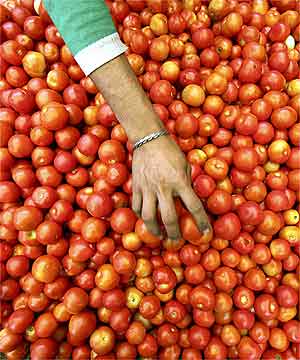In recent weeks, Massachusetts finds itself grappling with an unsettling outbreak of salmonella linked to contaminated tomatoes, echoing a widespread concern in the food safety landscape. This bacterial infection poses significant health risks, particularly in vulnerable populations, as public health officials scramble to trace the source of the outbreak and mitigate its impact. The alarming situation calls for an in-depth examination of the various facets of this health crisis, which affects consumers, farmers, and regulatory bodies alike.
Initially, the outbreak’s genesis can be traced back to a contaminated shipment of tomatoes distributed across various Massachusetts markets. Health authorities have indicated that while salmonella can proliferate in undercooked foods, raw vegetables, particularly tomatoes, have recently been implicated in numerous foodborne illness incidents. Given their widespread consumption in salads, sauces, and sandwiches, the potential for public health consequences is considerable.
Symptoms of salmonella infection typically manifest within six hours to six days after exposure, presenting as fever, diarrhea, abdominal cramps, and vomiting. These debilitating effects usually last between four to seven days, yet severe cases may necessitate hospitalization, particularly among children and the elderly. Therefore, vigilance regarding food sourcing and preparation methods is pivotal for safeguarding public health.
The implications extend beyond mere health concerns. For farmers and suppliers, a salmonella outbreak can wreak havoc on business operations. Affected agricultural producers may face heightened scrutiny and potential recalls of their products, leading to financial losses and disrupted supply chains. Moreover, consumers are increasingly cautious, leading to reduced demand for tomatoes until the situation is resolved, illustrating the far-reaching effects of food safety issues.
Regulatory agencies, including the Food and Drug Administration (FDA), have initiated investigations to identify the specific farms implicated in the outbreak. Through meticulous tracing and testing of both domestic and imported sources, officials aim to stem the tide of infections rapidly. The necessity for comprehensive agricultural monitoring and stringent food safety protocols is underscored by this incident, highlighting essential improvements in the food supply chain.
In response to this crisis, public health officials encourage residents to stay informed and practice proper hygiene. Thoroughly washing tomatoes before consumption can significantly decrease the risk of exposure to harmful pathogens. Additionally, local markets and grocery stores are urged to cooperate fully during the investigation, ensuring that any contaminated produce is promptly removed from shelves to protect consumers’ health.
As Massachusetts navigates this salmonella outbreak, it becomes incumbered to scrutinize not just the immediate implications for public health, but also the broader ramifications for agricultural practices and food safety regulations. In an age where foodborne illnesses are increasingly prevalent, this incident serves as a solemn reminder of the importance of vigilance, cooperation, and transparency within the food industry.
